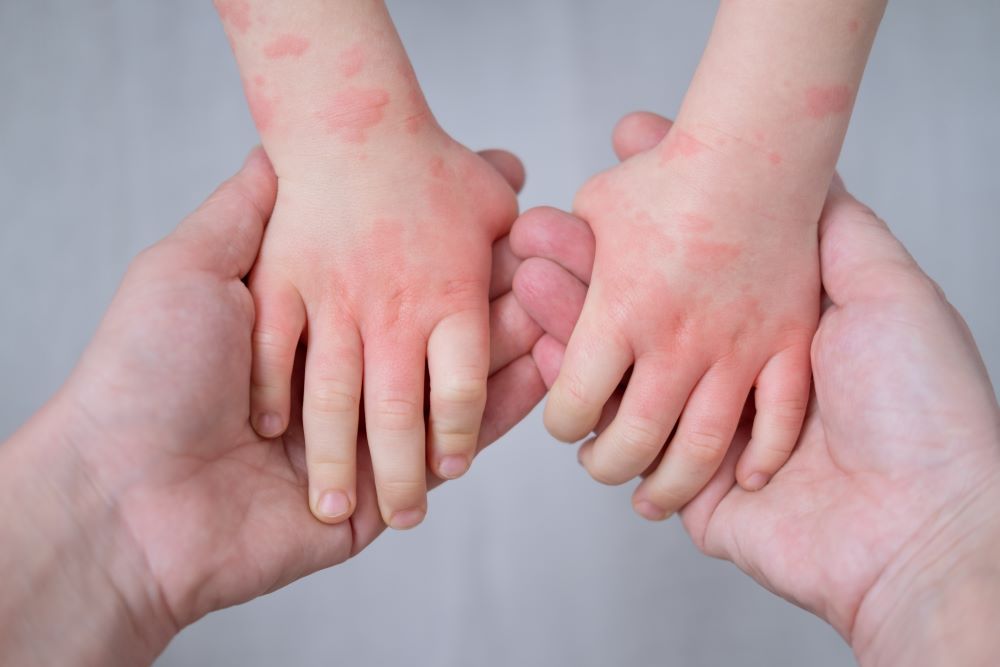
Are you dealing with the persistent discomfort and itching of eczema? You're certainly not alone. Millions of individuals in the United States are confronted with the daily challenges of eczema, from the incessant itch to dryness, unsightly rashes, and troublesome blisters.
In this informative guide, we'll uncover the underlying causes of those frustrating eczema flare-ups and equip you with practical strategies to take control and reclaim your skin's health.
Understanding Eczema
Eczema is a complex condition that goes beyond mere rashes. Picture relentless itching, parched skin, and humiliating rashes – these are the key signs of eczema. It presents in seven distinct forms, each with its unique characteristics: atopic dermatitis, contact dermatitis, dyshidrotic eczema, nummular eczema, seborrheic dermatitis, and stasis dermatitis. While eczema can manifest at any age, it often begins in childhood and persists into adulthood. The incessant itching leads to excessive scratching, which in turn worsens the condition.
What Causes Eczema?
Eczema's underlying causes are complex, but they often involve a compromised skin barrier. Normally, our skin acts as a protective barrier, but in individuals with eczema, this barrier is weakened, making the skin more susceptible to irritants, allergens, and environmental factors. When the skin barrier is compromised, it triggers inflammation, leading to the development of eczema and itching.
Several factors can increase the risk of developing eczema, including genetics, family history, and environmental factors. While researchers are still uncovering the precise reasons why some individuals are more prone to eczema than others, there are common triggers that can worsen eczema symptoms.
Identifying Common Eczema Triggers
Now, let's delve into the factors that can trigger eczema, understanding how they aggravate the condition and how you can take charge of your skin's well-being:
1. Fragrance
Fragranced cosmetics and skincare products can be a wolf in sheep's clothing. Harsh ingredients can trigger eczema flare-ups.
Tip: Opt for gentle, fragrance-free skincare products tailored for sensitive skin. The absence of fragrance reduces the risk of irritation.
2. Preservatives
Some food and personal care products contain preservatives that spell trouble for eczema-prone individuals. Parabens, a common class of preservatives, are known to be potential triggers.
Tip: Keep an eye on ingredient lists and steer clear of products that contain parabens or other known triggers. Opt for natural and preservative-free alternatives whenever possible.
3. Harsh Cleaning Products
Your favorite household cleaners may give your home a sparkling shine, but they can also trigger eczema. Harsh chemicals in cleaning products can irritate your skin.
Tip: Swap out harsh cleaning agents for milder alternatives. White vinegar can replace glass cleaner, and baking soda works wonders in place of bathroom and kitchen cleaners.
4. Exercise
While exercise is great for your overall health, sweating can be a trigger for eczema. The moisture can irritate your skin.
Tip: Choose moisture-wicking workout attire to minimize skin irritation during exercise. Afterward, a lukewarm shower is your best post-workout friend.
5. Allergens
Allergies, whether food-related or environmental, can be eczema's accomplices. Common food culprits include eggs, wheat, animal milk—and yes—even chocolate.
Tip: Work with a healthcare professional to identify and manage allergens. An elimination diet may help pinpoint specific triggers to avoid.
6. Stress
Stress is a double-edged sword when it comes to eczema. It can induce sweating (an eczema trigger) and negatively affect your immune system.
Tip: Practice stress-reduction techniques such as mindfulness, yoga, or meditation to keep stress at bay and your skin happy.
7. Air Pollution
Pollution isn't just harmful to the environment; it can also wreak havoc on your skin. Substances like formaldehyde, tobacco smoke, and paint fumes can trigger eczema symptoms.
Tip: Whenever possible, minimize exposure to polluted environments. Proper ventilation and air purification can help reduce indoor irritants.
8. Climate Causes
Environmental factors like extreme heat, dry air, humidity, and UV rays can all trigger eczema.
Tip: Adjust your living environment as needed. Use a humidifier to maintain indoor humidity levels, protect your skin from excessive sun exposure, and stay hydrated.
Seeking relief from Eczema?
For those seeking relief from eczema symptoms, CLn BodyWash offers an innovative solution. This gentle, non-drying formula is designed for skin prone to eczema, redness, irritation, rash, itching, dermatitis, as well as Hidradenitis Suppurativa (HS). With consistent use, CLn BodyWash can deliver remarkable results, leaving your skin not only smooth but also noticeably clearer, healthier, and revitalized.
What differentiates CLn BodyWash is its ability to effectively alleviate the dryness, flakiness, and redness associated with eczema-prone skin. Users can witness significant improvements in as little as three applications, all achieved within a mere 1-2 minutes during their daily shower or bath.
CLn BodyWash represents a new approach to managing challenging skin conditions. It was developed in collaboration with leading dermatologists to provide the benefits of medicated baths without the inconvenience. This daily cleanser is gentle on the skin and won't damage clothing, making it easy to incorporate into your daily routine.
Key Takeaway
Eczema triggers can vary from person to person, but identifying and managing them is crucial for maintaining healthy skin. Empower yourself by choosing the right skincare products, controlling environmental factors, and considering innovative solutions like CLn BodyWash.
If you're struggling with eczema symptoms, consult with a dermatologist to develop a personalized management plan and consider incorporating CLn BodyWash into your skincare routine for potential relief from eczema-related discomfort. Your skin deserves the best care, so take empowered action today.
